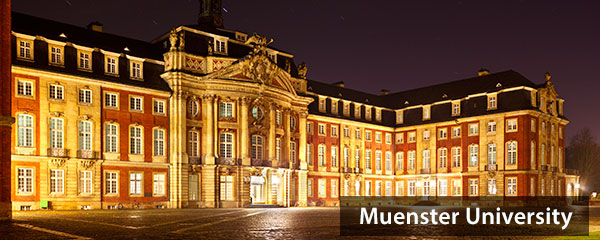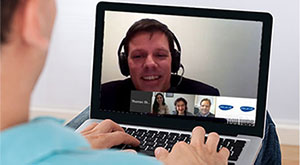Case Study: PhD Student in Molecular Neuroscience at Muenster University
Shweta Gaikwad is undertaking a PhD in Molecular Neuroscience at the University of Muenster in Germany with Professor Markus Missler. She moved to Germany in 2009, having achieved a distinction in her MRes degree in Neuroscience at Nottingham Trent University. This is not Shweta’s first visit to Germany – in 2006 she spent six months undertaking research at the University of Karlsruhe as part of an MSc in Molecular Biology. Shweta recently talked to Sarah Marten about her experience of working overseas in Germany.
Why did you choose to work overseas?
I really enjoyed my time undertaking research at Karlsruhe University in Germany as part of my MSc in Molecular Biology at Skovde University in Sweden. Germany is the leading research country in central Europe, and has a very good base in biological sciences with many prominent research groups. My first visit to Germany had provided me with excellent opportunities for networking and I felt it would be a very good place to start out my career.
Forschungszentrum-Karlsruhe has a large biological sciences community, with research in many fields including cancer, genetics, and neuroscience. The interdisciplinary environment provided much opportunity for discussion with academics and the chance to view one’s research from different perspectives. My first visit to Germany had been a great opportunity to meet many different people within my discipline.
Whilst at school in India I had studied German for one year, which really helped me, because although I was not fluent, I had a basic understanding of quite a difficult language.
When I finished my MRes at Nottingham Trent University in November 2008, I started looking for PhD opportunities with prominent research groups all over Europe whose work complemented my scientific research interests. Germany appealed to me as I had lived there previously – it was a happy coincidence that most of the groups I applied to were in Germany. Germany also offers attractive PhD fellowships, and the fellowship of the CEDAD-IMPRS graduate school in Muenster entitles me to a tax-free stipend every month which is sufficient for a comfortable lifestyle and is higher than the stipend offered in some other countries. I also applied for two PhD positions in the UK, although I was unlikely to receive funding as I am non-European.
What was the application procedure like?
Firstly I applied for several PhD studentships using jobs.ac.uk, and the process is much more involved than applying for an ordinary job. Your CV and application needs to be individually tailored to each research group, as every professor or principle investigator wants detailed proposals from applicants. I had only just finished my MSc, and the application process can seem quite overwhelming, requiring a level of mature scientific thinking. At this stage you need to be very sure that this is what you want. The application to the graduate program I am working in presently was different. I had to hand in a completed application form together with copies of certificates. Later, I gave a short presentation on my former project and had several interviews with heads of laboratories which I found interesting.
PhD applications cannot be taken lightly – a PhD is a long-term commitment involving many years of hard work and long hours in the lab. You may sometimes need to sacrifice weekends and holidays for the sake of your research. When applying for PhD fellowships there are two main factors to consider. The first is the research area and you need to be sure that you are applying for something that really interests you. The second is finance – as a foreign student this is particularly pertinent for me. My PhD is initially funded for three years, although I hope that my funding will be extended for a further year to write up my research.
How did the visa process go?
Obtaining a visa to undertake my PhD in Germany was straightforward. After finishing my MRes at Nottingham Trent University I returned home to India as my UK student visa had expired. I applied to the German Consulate in Mumbai, and after completing the necessary form I visited their offices. Because I had been accepted by a German University and had been a student in Europe in the past obtaining the necessary research visa was easy, and in fact only took half an hour. In other areas of India this would probably take longer.
What was it like in the first few days/weeks?
I had already studied in Europe before so moving to Germany, despite not knowing anyone, was not particularly daunting. I am a very independent person, and love travelling and meeting new people. However, in the first few days and weeks there is a lot to do, as you have to become familiar with life in a different country, and also become accustomed to your new work.
In the first few months PhD students normally spend a lot of time on background reading, and since I was moving into a different research area this was particularly important. I also needed to become familiar with the lab, as every lab has different methods and protocols. New researchers also need to set up their own protocols for experiments to provide a firm foundation for future research and all this can be time-consuming. I would say that this settling-in process takes about two months.
The first few months of a PhD are particularly hard work and it is important to establish a balance in your life early-on. It is possible to become burnt out and I have seen that happen to other people. I love climbing as it offers such a relief from the pressures of working in a lab all day. Because there are no mountains near here, I attend a local gym to use their climbing wall on a regular basis.
Undertaking a PhD can involve many ups and downs – the ups are brilliant and exhilarating, but you also need patience to deal with the inevitable downs. Even downs should be viewed positively since they enable you to move forward with your research.
What about your accommodation?
The HR department at the University of Muenster organised my accommodation, and I have a great studio apartment which forms part of the nurses’ quarters. Several other researchers also live here, and as long as you make the effort it is easy to get to know other people. The flat is fully furnished, making life very convenient, particularly for those from overseas.
Did you experience a language-barrier?
Most people in Germany speak English, but having a basic understanding of German makes such a difference. When you step off the plane obviously all the signs are in German and without at least some knowledge of the language life would be much harder.
Everyone else in our research team is German, but all our work is conducted in English. English is the international language of science, and although everyone is happy to use English I also feel it is important to learn German whilst I am here and I am making good progress at local classes. People really appreciate any effort you make to use the native language, both inside and outside the University. Muenster is quite a small city, and cultural activities such as theatre are always in German. Larger cities in Germany would be more multicultural.
How is your PhD funded?
The funding for my research comes from the Graduate Program Cell Dynamics and Disease (CEDAD) and the International Max Planck Research School-Molecular Biomedicine. I have been able to live comfortably on the fellowship I receive, which is fortunate because there would be no time for a part-time job whilst undertaking a PhD. I have to focus on my research every single moment. I am much better off than I was when I was a student, although the money from a fellowship is less than you would earn in a salaried job.
What does your research involve?
My research focuses on beta-neurexins, which are cell adhesion molecules present at the synapse. A synapse is a junction between two neurons (axon to dendrite) or between a neuron and muscle cell through which cells transmit information. Our group focuses on synaptic cell adhesion molecules.
We work on the regulation of neurotransmission by synaptic cell-adhesion molecules and the molecular and cellular determinants of the formation and plasticity of synapses. These are fundamental processes to understand the basics of sensations, cognition and learning as well as to investigate their underlying causes of debilitating brain disorders.
My work involves elucidating the functions of beta-neurexins, which have been implicated in autism and obesity. I am characterising the biochemical, anatomical and functional effects of knocking out all three beta-neurexins using mice as a model system. I hope to be able to unravel the functional significance of beta-neurexins through my work.
Does your work involve any demonstrating for undergraduates?
Next semester I will be a teaching assistant for the undergraduate lab course, which will involve demonstrating techniques and setting up the labs for the students. This is a requirement of my PhD here at the University of Muenster, and will help prepare for future academic work.
Do you work as part of a team?
Our 17-strong team of PhD students, postdoctoral researchers and technicians in the Department of Anatomy and Molecular Biology is headed by Professor Markus Missler. Our professor likes to be very closely involved with his research team and spends a lot of time in the lab. He has always had a lot of time for me, and has given me lots of support and help, which is always important.
What is the social life like?
At the start of a PhD there is not a great deal of time for a social life, as you have to throw yourself into your work. Of course you spend all day with your colleagues in the lab, and you soon become friends. We sometimes go for a drink after work, or share meals at one another’s homes. Making new friends takes a little while, and although German people are very friendly, they can also be slightly reserved at first. Everyone put themselves out for me, and I did not feel an outsider despite being the only non-German person in the team.
What hours do you work?
My hours in the lab are usually long, anything from eight to twelve hours a day. However, this does not make me miserable, as I enjoy the work so much, as well as the companionship of my colleagues. Lab-work is intense and you have to be prepared for this. But I also make time for friends and other interests – this is vital.
Where do you see yourself in the future?
I would love to stay in research, although clearly teaching usually goes hand-in-hand with this. After finishing my PhD I will be looking at postdoctoral opportunities in the US; it is such a big country with so much exciting research taking place. Gaining experience there would be really beneficial to my career.
Should I become tired of lab work, there are lots of other opportunities such as scientific reporting or a move into industry. However, I suspect that a post in industry would mean less independence in your research, so this is something I would have to consider very carefully.
What are you enjoying most about your time in Germany?
The whole experience of working in Germany has been very enjoyable, and I really love this job. Working in science is a way of thinking, and you have to be passionate about it. The social life here is really good, and whilst in Germany I have really developed my independence. At present I am also planning a symposium for our Graduate School which involves lots of responsibility and planning – this is something I find very rewarding.
Email enables me to keep in touch with friends and family elsewhere, and my parents have been able to visit me here from India. In addition I am also able to fly home for a holiday once a year. Having a supportive family makes a great difference, and they have encouraged me to work overseas.
What was the worst moment?
At the beginning of my PhD I did not know anyone at all in Muenster and it does take time to break the ice with new people. However, I am very independent and outgoing, so this was not really a problem for me.
Have you got any advice for anyone planning to take a PhD?
Only embark on a career in research after very careful thought – this must be a mature decision. You will need an inquisitive nature, self-belief and a vision about the contribution you can make. Don’t go into research if you are only looking for a job as you will be disappointed. You also need to be patient, self-disciplined and very well-organised in order to plan your own work.
Working abroad on your own can be lonely at first, so you have to be determined to make friends and establish a social life. Always make sure that your funding will be sufficient to enable you to complete all the research as well as the writing-up – check this out at the interview stage.
Biography
Shweta Gaikwad attended Bangalore University in India after leaving school, achieving a first class honours degree in Chemistry, Genetics and Microbiology. She then completed her first master’s degree in Sweden, an MSc in Molecular Biology specialising in Biotechnology, at Skovde University. This course also included a six month research project in toxicogenomics at Forschungszentrum-Karsruhe in Germany.
Shweta then moved to the UK, attending Nottingham Trent University to undertake a second master’s course, this time a Master of Research (MRes) in Neuroscience, which she passed with distinction. This was a research-based degree, and Shweta performed research into the study of oxidative damage to proteins in relation to Parkinson’s disease. Shweta started her PhD at the University of Muenster in 2009, which will be completed by 2013.
by Sarah Marten
Max Saved Jobs Reached
A maximum of 500 Saved Jobs can be created against your account. Please remove an existing Saved Job in order to add a new Saved Job.
Manage Saved Jobs









